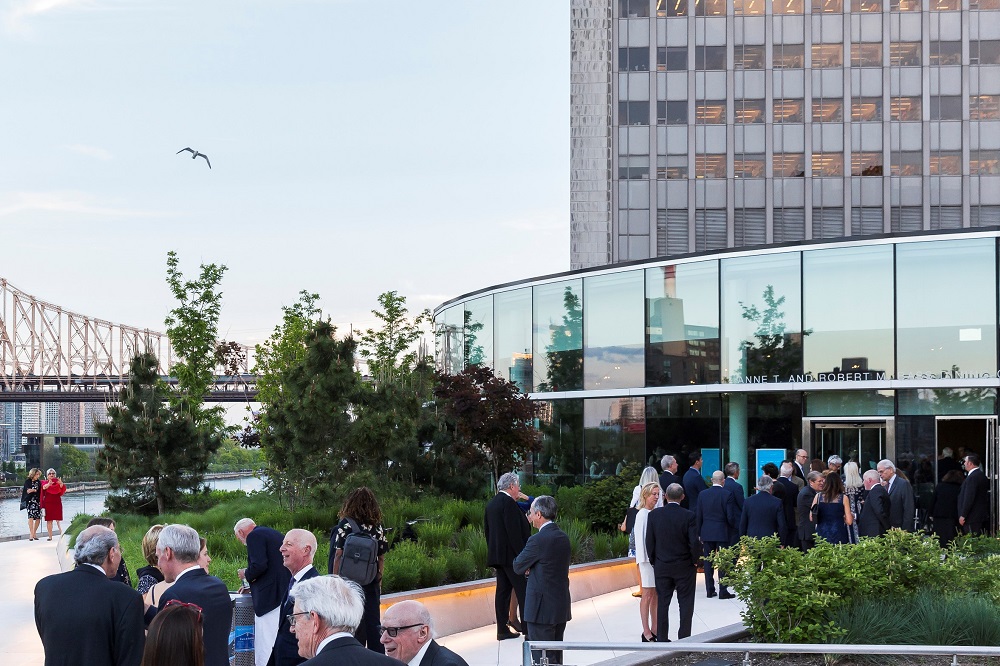Posted on September 10, 2019
New York, NY — The Starr Foundation has made a $50 million grant to The Rockefeller University to establish the Maurice R. and Corinne P. Greenberg Center for the Study of Inflammation, Microbiome, and Metabolism and The Starr Center for Computational and Quantitative Science.

A dinner for benefactors was held earlier this year, celebrating the successful end of the fundraising campaign and the dedication of Rockefeller’s new SNF-DR River Campus.
Below is the press release distributed by the University:
The university’s Campaign for Transforming Biomedicine—which raised $1.17 billion over eight years—closed this summer with a bang: three significant capstone gifts, made in the campaign’s final months, to directly support Rockefeller science. The contributions, totaling $60 million, were made by The Starr Foundation and the Robertson Foundation.
“It has been a year with significant infrastructure investments critical to the work of Rockefeller scientists,” says Richard P. Lifton, the university’s president. “To also receive such substantial contributions to our ongoing science, including our faculty recruitment efforts, shows the dedication our benefactors have in their support of our work. These gifts are critical to our research programs and we are immensely grateful to the Starr and Robertson Foundations for their generosity.”
The Starr Foundation, led by Trustee Emeritus Hank Greenberg, made two gifts in the amount of $25 million each. One endows the Maurice R. and Corinne P. Greenberg Center for the Study of Inflammation, Microbiome, and Metabolism (previously known as the Center for Basic and Translational Research on Disorders of the Digestive System). More than twenty Rockefeller laboratories currently participate in this consortium, investigating microbiome dynamics, metabolic disorders, chronic inflammation, autoimmunity, cancer, and other diseases that affect the digestive system.
Since it was established in 2012, with funding from the Helmsley Charitable Trust, the center has been led by Barry S. Coller, physician-in-chief of The Rockefeller University Hospital and the university’s vice president for medical affairs.
“With the Starr Foundation endowment, we can continue the pilot grants, fellowships, seed funding, and symposia that make this center so productive, and we can continue to expand our interdisciplinary approach to supporting basic and translational research on these vital topics,” says Coller.
The foundation’s other $25 million gift will establish the Starr Center for Computational and Quantitative Science, a new center with a broad mandate to expand the university’s capabilities in applying advanced mathematics and computation to the analysis of biological and biomedical data, including artificial intelligence and deep learning approaches to analysis of the very large data sets of diverse types that are becoming commonplace in fields including genomics, structural biology, neuroscience, developmental biology, drug discovery and biomedicine. The gift will support recruitment of new faculty and will fund new equipment and operating costs.
“Rockefeller is currently harnessing big data to analyze large-scale genome sequences and cryo-electron microscopy data, and we’ve created both a centralized high performance computing cluster and a Bioinformatics Resource Center,” says Lifton. “But future leadership will require us to greatly expand our capabilities; this new center is a critical and timely investment.”
During the campaign, The Starr Foundation also renewed its support of two multi-institution consortia in which Rockefeller participates—the Tri-Institutional Stem Cell Initiative and the Starr Cancer Consortium.
The Robertson Foundation, established by Trustee Emeritus Julian Robertson, made a gift of $10 million to support the recruitment of tenure track faculty. Maintaining Rockefeller’s ability to attract the best and brightest through generous start-up packages, including unrestricted research funding and ongoing laboratory support, is crucial to the university’s mission.
This grant will help fund the recruitment of the second, fourth, sixth, and eighth new faculty members recruited by Rockefeller, provided that the university is able to raise money for the first, third, fifth, and seventh. This is the second “challenge grant” from the Robertson Foundation for faculty recruitment. The initial Robertson grant helped with start-up costs for four early-career HOLs who joined the faculty between 2013 and 2017.
Earlier in the campaign, the Robertson Foundation made two grants totaling $40 million to the Robertson Therapeutic Development Fund—$25 million in 2013 and $15 million in 2018.
“The new contributions from the Starr and Robertson Foundations are a testament to the commitment of our benefactors,” says Marnie Imhoff, Rockefeller’s senior vice president for development. “Thanks to their generosity our community is able to remain focused on groundbreaking biomedical science.”
The Campaign for Transforming Biomedicine began in 2011 with the goal of raising $940 million over nine years to advance Rockefeller science. The campaign exceeded this goal by $230 million upon its June 30, 2019 closing.
The contents of this post originally appeared as an announcement by The Rockefeller University.
###
